Nice work if you can get it. Imagine what cosmetic companies must do to get the "clean stamp" from the Environmental Working Group (EWG), a perennial target of ACSH because of its weak science (but robust finances - more on that later)
Since 2004, EWG's Skin Deep® cosmetic database has helped people protect themselves from potentially toxic chemicals in personal care and beauty
The EWG can't tell a toxic chemical from a badminton shuttlecock
Josh Bloom, ACSH Site
If you're wondering what business an environmental group has rating the safety of 10,500 personal care products, so am I. It's not like we have to protect whales from toxic eyeliner. Yet, they proudly feature this:

Personal care chemicals are given ratings by EWG. I wonder what does one have to do to get a product on the EWG VerifiedTM li$t?
I suppose we can overlook the odd fact that an environmental group somehow got into the business of evaluating the safety of chemicals in cosmetics provided that they know what they're talking about. Don't bet the house on this. When it comes to chemistry acumen, EWG is right up there with Australian wombats (Quiz: What is the strangest fact about wombats?) (1)
With September right around the corner, I recently bought a bunch of peaches – one of the many delights of summer – and smelled them to determine ripeness. Ah, what a fantastic scent! Of course, the scent comes from a whole bunch of chemicals – something the EWG doesn't much like. So I thought it might be interesting to take a look at some of the chemicals that are responsible for the wonderful scent and flavor of peaches (2). And why not look these up in the Skin Deep® database just to see what EWG might have to say about them?
First, the chemicals that give peaches their delightful properties have been identified in an article in the January 2017 issue of the Horticultural Plant Journal. Figure 1 (left) shows the scent chemicals across the top and also the flavor chemicals (right).
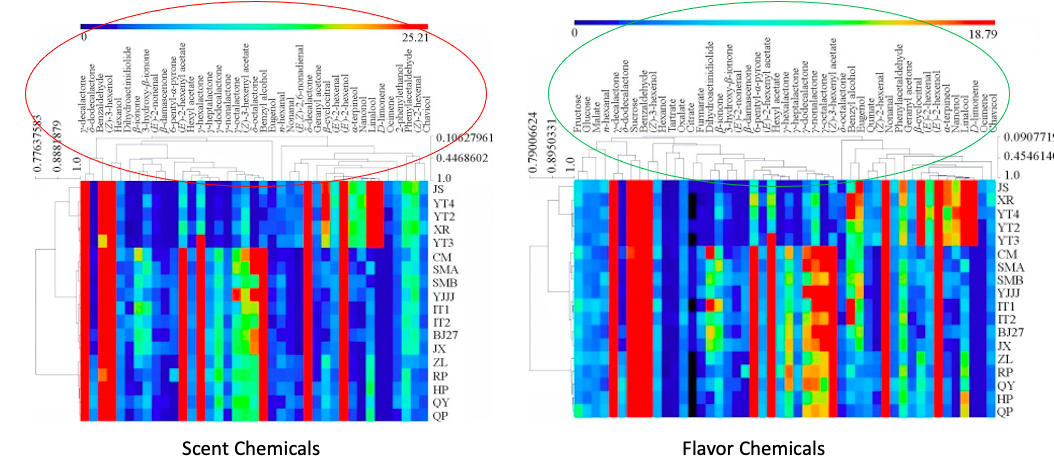
Figure 1. Scent (right) and flavor (left) chemicals (in the ovals) detected in 18 peach varieties (the capital letters to the right of the graph). Source: Wanpeng, et. al., Horticultural Plant Journal, Volume 3, Issue 1, January 2017, Pages 1-12. https://doi.org/10.1016/j.hpj.2017.01.012
Let's look at three of the peach chemicals and what EWG has to say about them.
1. Benzyl alcohol

EWG rates benzyl alcohol rather poorly. It can cause skin allergies (this is true) even though it is very commonly used in skin products (as an antiseptic and preservative), shampoos and detergents, moisturizers, and baby products. The USDA considers it "safe for use in foods." Benzyl alcohol has a pleasant, flowery scent and is found in various essential oils, including jasmine, hyacinth, neroli, and rose. It is also found in a variety of foods, such as apricots, cocoa, cranberries, honey, mushrooms, and snap peas. And, of course, peaches.
Yet, EWG rates it 4-6 on a scale of 1-10, where 10 is the worst. Why? Perhaps because it has been mentioned 5667 times in the literature where toxicity may be discussed. Or maybe EWG considers it to be a "human toxicant" and a "modern human health priority." Seriously? Gee, let's stop giving COVID vaccines and go after benzyl alcohol. Duh.
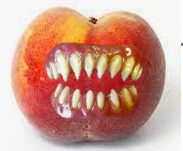
Beware! Steve, the Killer Peach is gonna get you. Photo: Wikipedia
2. Eugenol
Eugenol is derived from several natural sources, especially cloves. It has long been used for medicinal purposes. For example, in dentistry, the oil is applied to cotton and stuffed into holes in teeth undergoing root canal.
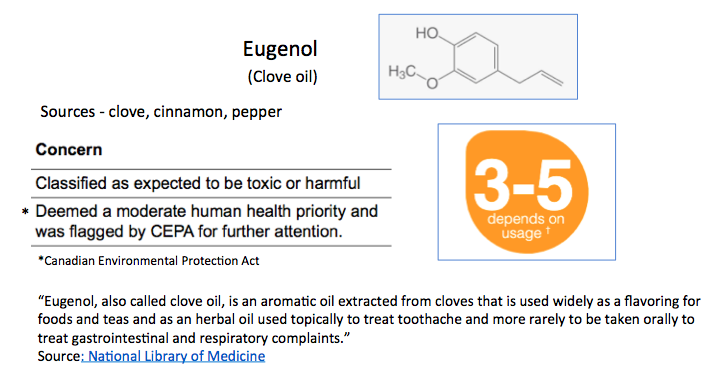
While it doesn't get hammered quite as hard as benzyl alcohol, EWG still classifies it as harmful and a human health priority. So, you'd better get rid of all your cinnamon and pepper rather than be exposed to deadly eugenol.
More stupidity: In organic farming, eugenol is also used as an insecticide, but only some of it.
"Synthetic eugenol is prohibited for use in organic farming under the USDA’s National Organic Program (NOP). Natural extracts of eugenol are allowed by the NOP and may be used as a botanical pesticide."
Source: Cornell University
Of course, there is exactly zero difference between eugenol extracted from cloves and that synthesized in the lab – just one of the many ridiculous (and unscientific) requirements of organic farming - some that EWG simply loves.
3. Limonene
Saving the worst for last, here's an especially harmless chemical that EWG has a problem with. Limonene is ubiquitous; it is found in the peels of lemons and oranges, other citrus fruits, and also pine trees.
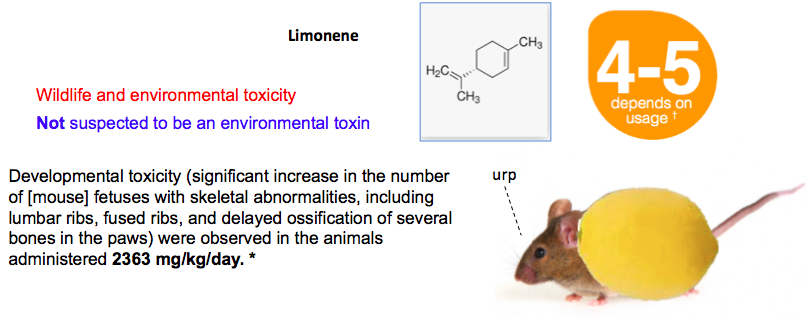
* Source: EPA
Some things to note here. Limonene gets a pretty bad score. Perhaps this is because it is classified as both an environmental toxin and also as not an environmental toxin. One of those must be correct, I guess. Limonene creates deformities in the fetuses of mice fed 2363 milligrams per kilogram weight of the mice per day. How much is this? A mouse weighs about 20 grams, so these poor critters are being fed about 50 mg every day. Assuming that this can be applied to humans (it can't really - it's just a rough estimate), then a 150-pound woman would have to consume about 3 grams of limonene per day to reach the mouse dose. And since limonene makes up 1.8% of the weight of a lemon we're talking about eating 150 lemons (rind included) per day. Whatever problems this may cause scurvy won't be one of them.
Why the crappy science?
Perhaps this explains it. The chart below is taken from the EWG's 2019 990 form (an IRS requirement for non-profits). The salaries of the highest-paid employees of a non-profit group must be disclosed. I added the education/background of the 11 highest-paid EWG employees in red. Shall we take a look?
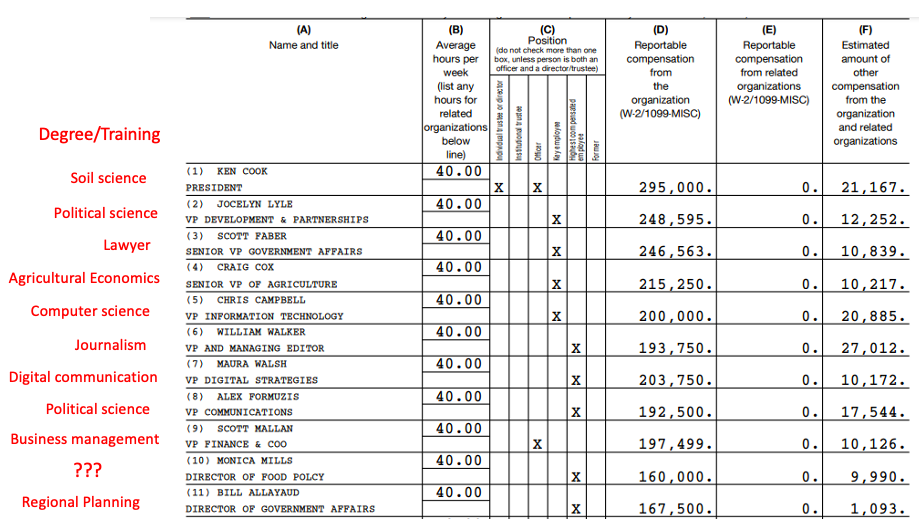
A number of things become immediately clear:
- These guys make some serious coin, especially for a non-profit (3).
- Where are the chemists? Biologists? Toxicologists? They are notably absent.
- Perhaps this explains why EWG has no business evaluating chemicals (or even talking about them).
- But if you need lawyers and poly-sci majors, you're in luck.
Since the EWG is very concerned about what you put on your skin, it is reasonable to assume that you should not rub a peach on your face, or you'll be exposed to at least three "dangerous" chemicals, at least by EWG standards, which are rather low, unlike their salaries, which are just peachy. But their science is the pits.
NOTES:
(1) Their turds are cubes. Knowledge is power.
(2) Nectarines are a type of peach. Who knew?
(3) I would reveal the ACSH top salaries but will refrain out of sheer embarrassment. You can look us up if you want.
Conflict of interest statement: I like peaches but have not yet rubbed one on my face. I reserve the right to do so in the future.




